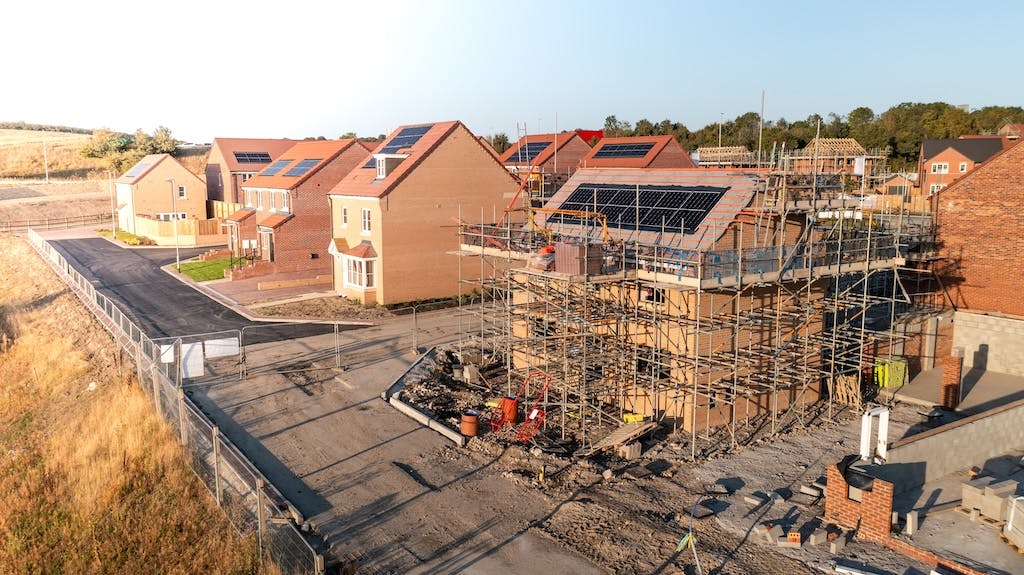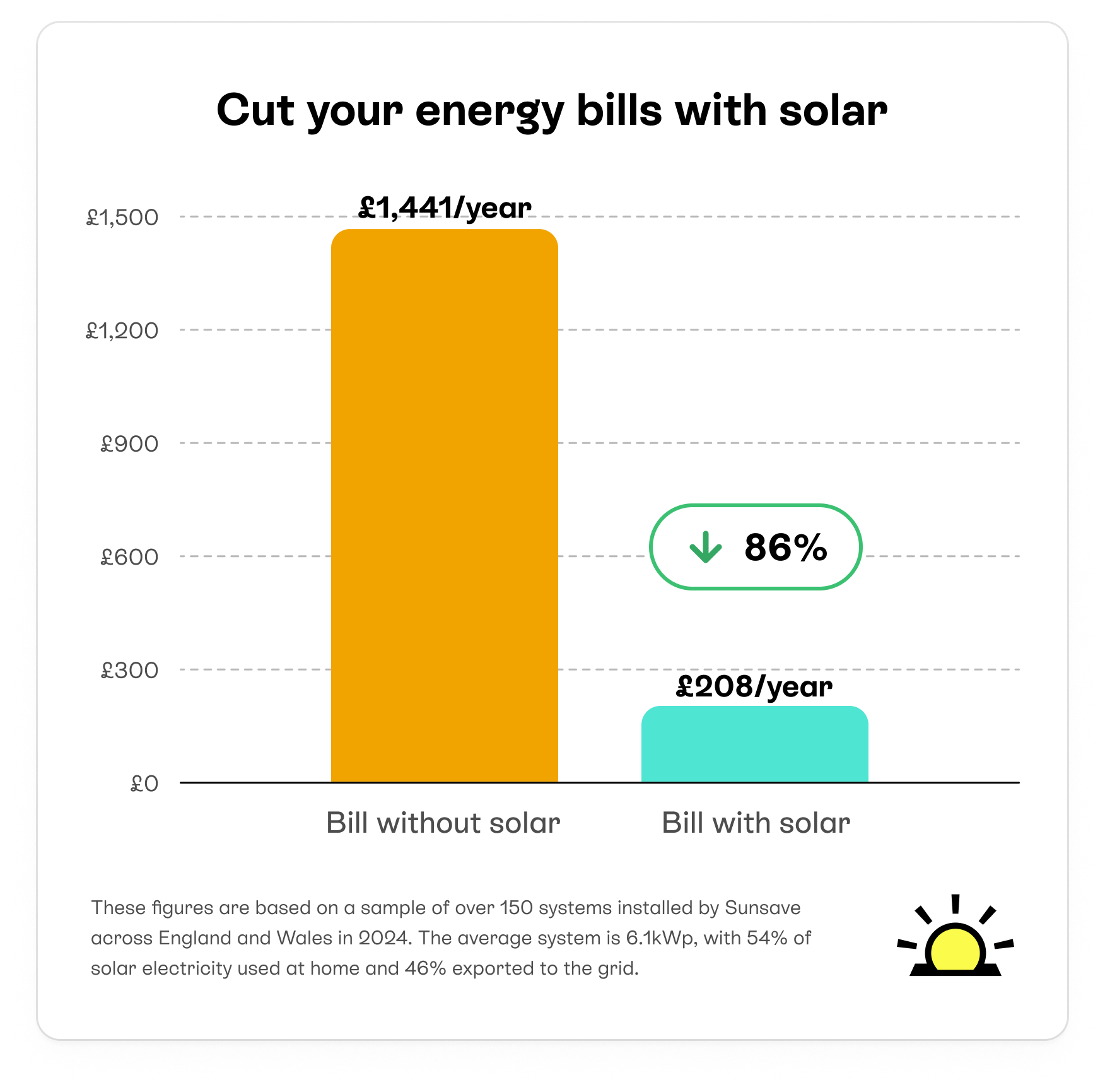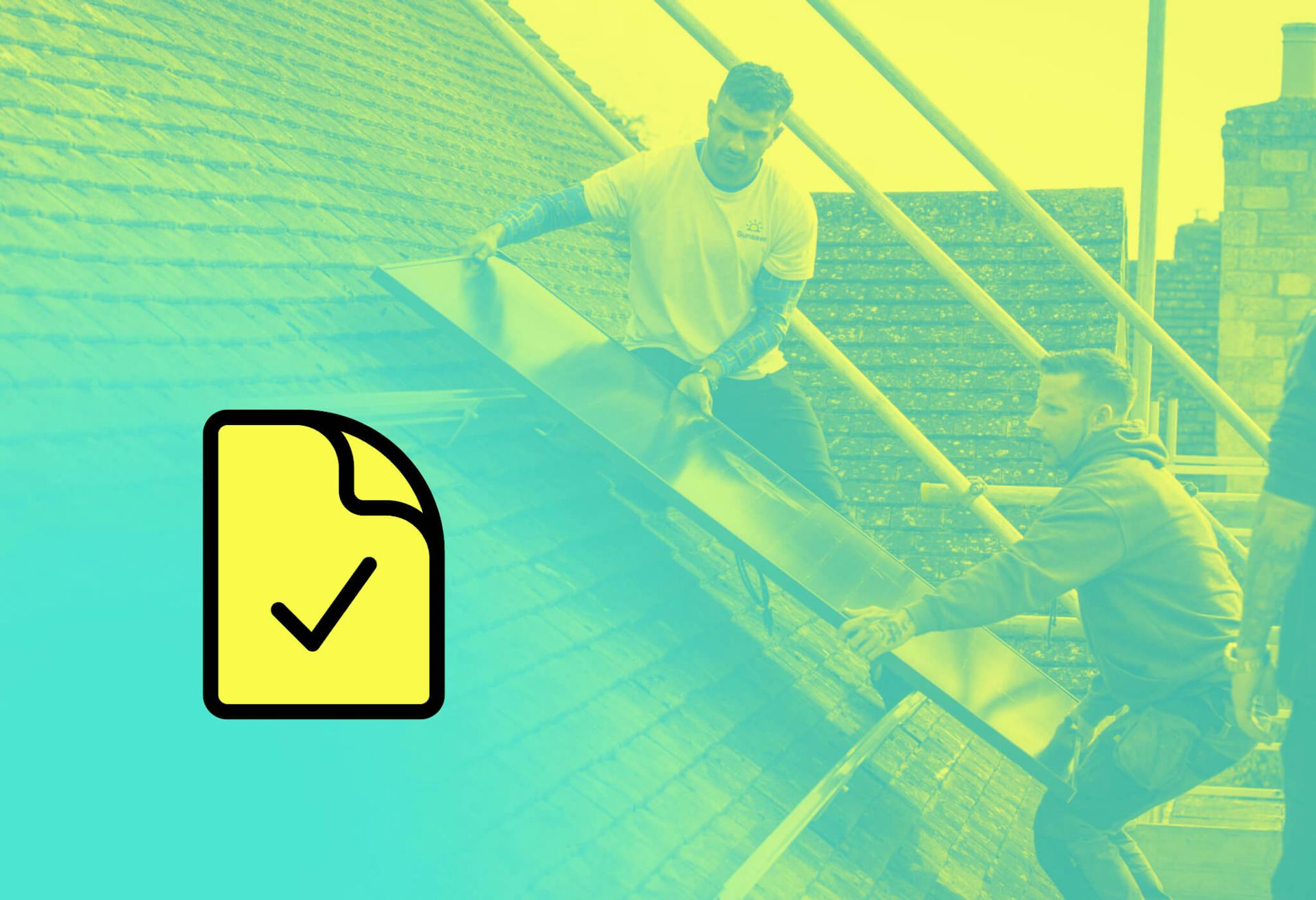- Solar advice hub
- Installation
- Solar panels on new builds: what are the rules?
Solar panels on new builds: what are the rules?
Here are the current regulations surrounding solar panels on new builds, and whether we expect them to change any time soon.


Why you can trust our content
We know that the solar industry is full of misinformation, but we only use reliable sources, including:
- Our experienced solar experts, installers and system designers
- Our own database of solar & battery system designs
- Authoritative bodies like MCS and the UK government




Calculate savings
What kind of home do you live in?
Calculate savings
What kind of home do you live in?
At a glance
There is a desperate need for more housing in the UK right now, and – in the face of high energy bills – a similarly desperate need for green energy.
It makes sense to kill two birds with one stone and ensure all newly built homes in the UK have solar panel systems – and that’s exactly what’s in the pipeline.
In this article, we’ll explore the UK’s current approach to solar panels on new builds, discuss what’s going to change, and see how countries in the EU are tackling the issue.
If you're curious about the savings you could get from a solar & battery system, answer a few quick questions below and we'll provide an estimate.
Find out how much you can save
What kind of home do you live in?
Are solar panels on new builds compulsory?
Solar panels are set to be compulsory for almost all new builds, from 2027 onwards.
Housing developers will be obliged to install solar panels on the “vast majority” of new homes, the government said when announcing the plan in June 2025.
There’ll be “rare exceptions” for properties which, for example, have “lots of shade overhead” – but solar homes will be the default.
The government is planning to include the requirement – and more details – in its new Future Homes Standard, which is slated for release in autumn 2025.
If it comes to pass, this will mark the first time that nationwide building regulations have actively promoted solar panels.
In the same government announcement, Energy Secretary Ed Miliband said: “Solar panels can save people hundreds of pounds off their energy bills, so it is just common sense for new homes to have them fitted as standard.
“So many people just don’t understand why this doesn’t already happen. With our plans, it will.”
What will the new regulations be?
The new regulations will focus on compelling housing developers to put solar panels on new builds in as many cases as possible.
With this in mind, the government has ditched a less stringent requirement included in a 2023 consultation on the Future Homes Standard , under the previous Conservative government.
This policy would’ve only obliged developers to install solar panels if the installation would cover an amount of roof space equal to 40% of the house’s ground floor area.
If this wasn’t possible, developers could’ve avoided installing any panels with no consequences – a policy which the current government has since criticised.
“This approach would have allowed for too many exemptions and no solar being installed on these developments,” it explained.
Under the current government’s plans, builders who can’t meet the 40% mark would still have to install “a reasonable amount of solar coverage.”
The Future Homes Standard may end up stating that new homes should be built with the ability to generate renewable electricity, rather than explicitly directing developers to install solar panels.
However, the government has said that “in the vast majority of cases, we expect this would be solar panels.”
That makes sense, since households across the country have embraced solar technology above all other renewable installations.
For instance, the Smart Export Guarantee, which compels big energy suppliers to pay households for their exported electricity, covers five sources of renewable energy – but solar panels made up 99.98% of registered systems in 2023-24.
Verified expertThe vast majority of new-build houses in the UK have very simple rooftops without any complications or obstructions, which makes them perfectly suited to solar panels.
Andrei Stavila
Technical Manager at Sunsave
Andrei has worked in residential solar installation for more than 17 years, and is a fully qualified electrical engineer.
How common are solar panels on new builds?
Solar panels won’t be compulsory on new builds until 2027, but they’ve already become a common way for developers to meet certain building regulations and make developments more sustainable.
Over the last three months of 2024, 42% of new homes in England were built with solar panels – a massive rise on the 13% figure from the same period in 2023.
Many construction companies choose to install them in order to meet the required Standard Assessment Procedure (SAP) score for energy efficiency.
By incorporating solar panels, developers enhance the property's energy performance, and also make it more attractive to eco-conscious buyers who are looking to save the time, effort, and expense of paying the high upfront cost of solar panels.
What is a building’s SAP score?
Introduced by the UK government in 1992, a building's SAP score is a calculation of its energy cost performance using criteria like insulation, heating, lighting, and renewable energy sources. Each building’s SAP score is also used to determine its Energy Performance Certificate (EPC) rating.
SAP scores are given on a scale of 1 to 100+, with higher scores indicating better energy efficiency and less environmental impact.
A score of over 100 would mean that the property’s net cost of energy over the year is less than £0, and that it’s making an overall profit on energy (for example through solar export tariffs).
There isn't a specific minimum SAP score for new builds, but homes with poor SAP scores and low EPC ratings are likely to be more difficult to sell. According to the UK Government's most recent English Housing Survey in 2021, the average SAP rating was 66 points.
Here are some measures developers can take to improve the SAP score for new builds:
- Ensuring walls, roofs, and floors are well-insulated to reduce heat loss
- Installing high-efficiency boilers or heat pumps
- Adding solar panel systems to generate renewable energy
- Using double- or triple-glazed windows with low U-values
- Incorporating LED lighting throughout the property
- Installing mechanical ventilation with heat recovery (MVHR) systems
- Minimising thermal bridging through careful design and construction practices
- Implementing smart thermostats and heating controls to optimise energy use

How do solar panels help with a property’s SAP score?
Solar panels are an effective choice for companies building new properties as they help reduce energy costs, which is a key factor in the calculation of an SAP score.
However, the specific number of SAP points that a solar panel system contributes depends on the system's size and other aspects of the property, such as insulation, heating efficiency, and overall energy demand.
SAP, which is used to decide EPC ratings, routinely awards homes around 10 points for a 2.5kWp solar panel system, which is far below the average domestic system size.
With the introduction of the Future Homes Standard, SAP will be phased out in favour of the Home Energy Model, a new methodology that should more accurately reflect the impact of a solar & battery system on a property's energy efficiency.
The current problem with solar panels on new builds
Installing solar panels on new builds is a great way to set households up with renewable energy from day one, and is set to become a legal requirement in 2027.
But even then, one problem will be difficult to solve: developers doing the bare minimum so they can say they’ve installed a solar panel system, by using just a small portion of the available roof space.
The property achieves a higher SAP score because it has a few panels, but the actual impact on the household’s energy bills is often negligible.
This can also create logistical challenges if the homeowner later decides to expand their solar panel system. Often, the original panels need to be removed in order to accommodate a larger system, which adds to the total cost of switching to solar.
A local community site for Eastbourne has highlighted this exact issue, reporting: "Thousands of new houses are being built in South Wealden without enough solar panels.
"Very similar in Eastbourne where apart from small schemes, houses are being built with either no or inadequate solar.”
The writer adds: "Where they are included, there can be as few as two panels and no battery."
The growing support for solar panels on new builds
The support for solar panels to become compulsory on new builds is growing.
A Censuswide survey in February 2024 showed that 70% of UK adults support mandatory solar panels on newly built homes, and nearly half of those surveyed plan to install solar within the next five years.
And a YouGov poll of 107 MPs in January 2024 found that 79% advocate for the inclusion of solar panels in all new constructions by 2025.
The government’s plan to mandate solar panels for the vast majority of new builds is surely a response to this general rise in enthusiasm, at least in part.
The rejection of the ‘Sunshine Bill’
Despite a majority of MPs favouring making it compulsory to install solar panels on new builds, a bill proposing exactly that was rejected by the government in January 2025.
MP Max Wilkinson's so-called 'Sunshine Bill' failed to get the government's support, with housing minister Matthew Pennycook saying that upcoming changes to standards would address the issue more effectively.
Pennycook said the Future Homes and Buildings Standards will “significantly increase rooftop solar deployment”, adding that “introducing conflicting legislation at this stage could create significant confusion”.
The Future Homes Standard
The government's Future Homes Standard has been in development since 2019, and hasn't made it past the consultation stage yet – but it’s due to be published in autumn 2025.
The requirements it imposes on homebuilders haven't been fully agreed upon yet, let alone drawn up, partly thanks to the change of government in July 2024.
Once they are, housing minister Matthew Pennycook has indicated there will be a period of transition, given that "the construction sector typically plans ahead by at least two, if not three or even more, years."
This is why the government is proposing to make solar panels compulsory on new builds from 2027 when it introduces the final version of the Future Homes Standard in autumn.

Are solar panels on new builds mandatory in Europe?
In May 2022, the European Union adopted the Solar Energy Strategy , which makes it compulsory to install solar panels on all new residential buildings by 2029.
The document also states that rooftop solar must be compulsory for all public and commercial properties larger than 250m² by 2027.
Any new buildings that match this description must be directed to install solar panels by 2026.
The Solar Energy Strategy aims to enhance energy efficiency and reduce carbon emissions across the EU.
And some European countries have got a head-start on these plans.
In 2024, France passed a law compelling owners of car parks larger than 1,500m² to install solar panels on their structures.
Car parks over 10,000m² must comply by July 2026, while those between 1,500m² and 10,000m² have until July 2028.
And in Slovenia, all new buildings with a roof larger than 1,000m² and all new car parks with floorspace that exceeds 1,000m² must have solar panels installed, as of 2024.
How much can new builds save with solar panels?
On average, you could save 86% on your electricity bills with a solar & battery system.
This figure is based on a sample of over 150 systems installed by Sunsave across England and Wales in 2024. The average system is 6.1kWp, with 54% of solar electricity used at home and 46% exported to the grid.
However, solar savings are generally higher than average for new builds, for two main reasons.
Firstly, putting solar panels on a brand new home tends to be a cheaper process, since it's usually relatively simple to put up scaffolding.
Most new builds are constructed with enough space around the property, in a standard box shape with one consistent roof, which neatly eliminates potential issues like lower roofs, dormers, extensions with flat roofs, and damaged tiles.
Secondly, one consistent roof means ample space for installing solar panels, and a greater number of panels leads to more electricity generation and higher energy bill savings.

Looking ahead
The current government is aiming to build 1.5 million homes in the UK by the end of its term, which will come in Spring 2029 . This means 300,000 newly constructed homes every year.
According to the National House Building Council, over 76% of new home registrations in 2023 were for detached, semi-detached, or terraced properties (including 1,466 bungalows).
Applying the same rate to this government's 1.5 million new builds, we can assume about 1.14 million of them will be suitable for solar. This represents a massive opportunity to transform energy bills for a vast number of households.
However, until meaningful legislation is put in place, it’s crucial that developers refrain from putting a pointlessly small number of solar panels on the roofs of new properties, as this only causes headaches for homeowners further down the line.
If you're thinking of switching to solar and want to find out how much you could save with a solar & battery system, enter a few details below and we’ll provide an estimate for you.
Find out how much you can save
What kind of home do you live in?
Solar panels on new builds: FAQs
Related articles

Written byMelody Abeni
Based in London, Melody is a specialist green technology writer who has been covering sustainability, climate action and ESG for the past five years, after gathering operational experience in green investing and financial services. She has written for various industry publications, including renewable technology advisor The Eco Experts, and she holds a Master’s degree in law from Birkbeck University.









